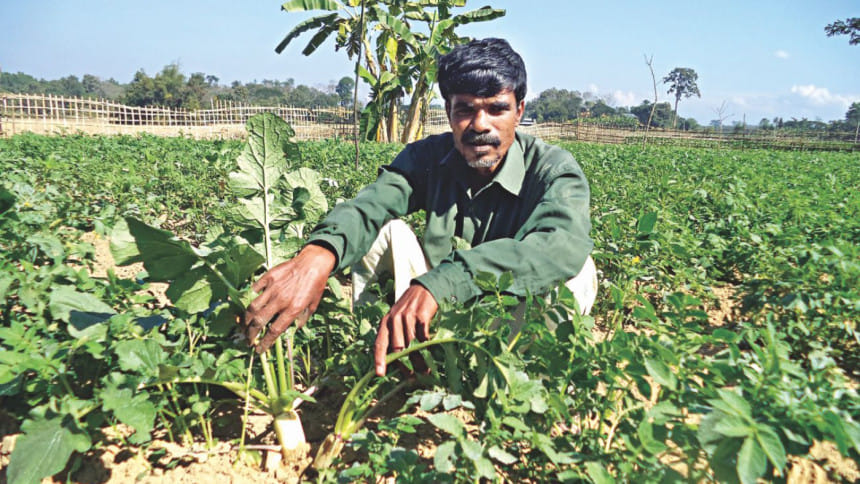Forgetting a dark past

Old habits die hard, so the saying goes. Chances are, for a thief like Motiur Rahman, from remote hilly Borochonkhula village in Chittagong's Rangunia upazila, a more honourable occupation will always evade him. Like many in his village, Motiur used to make his living selling illegally felled timber sourced from the nearby Dudpukuria-Dhupachori sanctuary. But in Motiur's case a life of thievery was not to be his destiny; and all it took to convince him otherwise was a little intervention, from a helpful snake.
“One fateful night I was busy cutting trees in the deep forest,” he recalls. “Suddenly I felt something in the dark bite my leg. It was really painful. By the time I realised it was a snake, the log I was carrying on my shoulder had knocked me over, leaving me unconscious.”
When Motiur came to his senses, he really came to his senses. Then and there he promised himself that if he survived he would give up theft once and for all.
“I readily admit to my past,” says Motiur. “Each week I used to make off with hundreds of trees from the forest to support my family.”
Looking for a new occupation, Motiur put his hand up to participate in training organised by a local non-government organisation, CODEC. He would learn about vermicompost, how to produce natural fertiliser using earthworms.
“Timber never really brought solvency to my family but vermicompost does,” says Motiur. “Nowadays I produce more than 2,000 tonnes of compost to earn over Tk 80,000 per month. My two siblings are in high school and it's no trouble to cover their expenses. One of them achieved a GPA-5 in the primary school certificate.”
As much as his improved economic condition, Motiur appreciates the dignity of an honest living. “Every morning people arrive at my home to buy fertiliser or ask questions,” Motiur says. “I enjoy teaching the other villagers how to make vermicompost. It can help them as well.”
He not only helps villagers informally but regularly offers his advice at formal training sessions too. And to cope with demand, Motiur has opened four sales centres for his compost.
“We didn't know anything about vermicompost,” admits local farmer Md Ibrahim. “Motiur distributed some for free and when we used it we found it achieves better results for our crops than chemical fertiliser.”
“Vermicompost is cheaper and also environmentally-friendly,” agrees another farmer, Abdur Rahim. “Our farming costs have reduced significantly because of it.”
“The vermicompost Motiur is producing has changed the whole economic scenario of our village,” says Md Golam Kabir Talukdar, chairman of the local Padua union council. “He not only achieved solvency for himself but has helped others master the process.”
With his newfound business to support him, promoting vermiculture hasn't been the only way in which Motiur has contributed to his community.
“For his integrity and hard work Motiur stands out,” says Narayan Das, the Chittagong regional coordinator of the climate resilience ecosystem and livelihood project, under which vocational training for Motiur was also provided. “He has encouraged at least 50 farmers to stop growing tobacco in favour of vegetables. It's an effort that earned him the Standard Chartered Agro Award in 2015.”
“Motiur is an inspiration for his community,” says forest range officer of Khurusia beat, Md Firoz Ahmed. “Once he was engaged in depleting the forest but now he makes an honest income.”
Motiur's future looks bright, all thanks to a snake in the deep woods which offered some invaluable, if rather sharp, 'advice'.


 For all latest news, follow The Daily Star's Google News channel.
For all latest news, follow The Daily Star's Google News channel. 



Comments